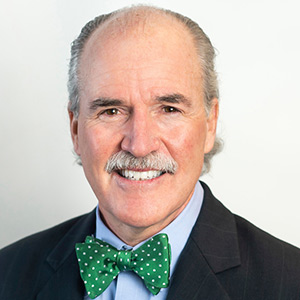Patient-centered climate resiliency can be achieved by focusing on the individual and their unique risk factors, according to Aaron Bernstein, M.D., interim director of the Center for Climate, Health, and the Global Environment at Harvard T.H. Chan School of Public Health (Harvard Chan C-CHANGE).
 Bernstein is helping to pen a chapter on human health for the Fifth National Climate Assessment, a Congressionally mandated report that evaluates climate change impacts in the U.S. (Photo courtesy of Aaron Bernstein)
Bernstein is helping to pen a chapter on human health for the Fifth National Climate Assessment, a Congressionally mandated report that evaluates climate change impacts in the U.S. (Photo courtesy of Aaron Bernstein)“We need to figure out the specific attributes of the individual, their environment, their genomes, and everything in between to advance strategies that are going to address the risks we can see coming,” he said during a Climate Change and Health Seminar Series presentation on May 13.
Bernstein is a pediatrician at Boston Children’s Hospital and an assistant professor of pediatrics at Harvard Medical School who has spent two decades researching the human health effects of climate change.
Precision medicine was the focus of his talk, which he positioned within heat mortality, while clarifying that precision medicine is applicable to any climate-driven health threat.
Those most vulnerable
“Climate change greatly elevates threats for a whole range of different illnesses that are being studied across the National Institutes of Health,” said Rick Woychik, Ph.D., NIEHS and National Toxicology Program director. “These include asthma, cancers, cardiovascular disease, stroke, foodborne illnesses, and extreme weather-related morbidity and mortality.”
 “We have a commitment to support research that helps us prevent, mitigate, and to adapt to climate change, especially for these at-risk communities,” Woychik said. (Photo courtesy of Steve McCaw / NIEHS)
“We have a commitment to support research that helps us prevent, mitigate, and to adapt to climate change, especially for these at-risk communities,” Woychik said. (Photo courtesy of Steve McCaw / NIEHS)Climate change disproportionately affects people in communities that experience social, economic, behavioral, and environmental challenges — particularly communities of color, rural populations, and those unduly burdened by exposure to environmental pollution.
“Risks do not fall equally across our populations,” Bernstein added.
A climate-resilient health clinics program between Harvard Chan C-CHANGE and Americares, which is supported by Biogen, is being piloted in California, Massachusetts, North Carolina, and Texas.
Patient vulnerability screening is one action the clinics can take that Bernstein says informs precision medicine.
Precision is personal
A heat vulnerability screening includes questions such as whether the patient is regularly sheltered, whether air conditioning exists where they reside, and whether their occupation is indoors or outdoors. Bernstein said these questions can be asked in early spring before the first major heat event of the year — which is often the one that is most dangerous for at-risk patients.
Precision medicine is informed by these screenings, especially when examined alongside other personal health attributes.
- Comorbidities such as diabetes, cardiovascular disease, and kidney failure can leave people more dehydrated or susceptible to electrolyte imbalances.
- Heat increases risk factors in pregnancy.
- Medication interactions can be caused by heat, and differences in the body’s ability to metabolize medicines might also contribute to excess risk from heat.
“Many factors have relevance to heat vulnerability, and they range from endogenous factors [such as genetics] to exogenous factors [such as the exposome],” Bernstein said. “We need to think comprehensively about all these factors and understand how they play off each other, and [learn] which ones really drive risk so that we can target interventions based upon those factors.”
Solutions in electronic health records
Seminar host Aubrey Miller, M.D., NIEHS senior medical advisor, asked how electronic health records (EHRs) can help to inform precision medicine.
“Practitioners could use EHRs to review certain sets of risks and then reach out to at-risk patients by sending these patients individualized heat alerts,” Bernstein said.
At-risk patients are contacted through the preferred contact method listed in their EHR. “That activates a plan focused on temperatures and resources that are actionable and real,” he said.
Machine learning techniques also will become increasingly helpful, but Bernstein warns there are many confounding complications in EHRs. Diagnosis codes can differ across practitioners, so he suggests using physician narratives instead. Also, regular medication reconciliation is a necessary step.
A cornerstone of precision medicine is the relationship between provider and patient, as well as the individual’s health status, biology, and environment, according to Bernstein. “I think our hope is that by getting a fuller picture of the individual through their clinical encounters, we can provide much more targeted interventions.”
The Climate Change and Health Seminar Series is hosted by the National Institutes of Health Climate Change and Health Initiative.
(Jennifer Harker, Ph.D., is a technical writer-editor in the NIEHS Office of Communications and Public Liaison.)









